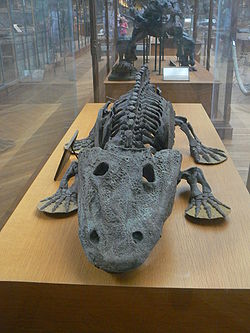
Back مقسومات الفقار Arabic Temnospondyli Bashkir Temnospòndils Catalan Temnospondyli CEB Temnospondyli Czech Temnospondyli German Temnospondyli English Temnospondyli Esperanto Temnospondyli Spanish Temnospondyli Basque
| Temnospondyls | |
|---|---|

| |
| Eryops, a large temnospondyl from the early Permian. National Museum of Natural History, Washington DC | |
| Scientific classification | |
| Kingdom: | |
| Phylum: | |
| Superclass: | |
| (unranked): | |
| Order: | Temnospondyli
|
Temnospondyls are an order of small to giant batrachomorph tetrapods. They lived worldwide from the Carboniferous to the Triassic. A few species continued into the Lower Cretaceous.
The Temnospondyls are similar or identical to the Labyrinthodonts minus the Lepospondyls. It is probably an evolutionary grade, not monophyletic. It is convenient to use, because all these early amphibia were so different from present-day amphibia.[1][2]p169 Many in the early Permian looked more like reptiles because they were adapted to life in a drier climate. Nevertheless, they were amphibians, and many larval stages have been found.
They are a large group of some 40 families and 160 genera.[1]p322 Fossils have been found on every continent. Their evolutionary history spans 210 million years. During this time, they adapted to a wide range of habitats including fresh water, terrestrial, and even coastal marine environments.
Fossils are known from the larval stage, metamorphosis, and maturity.[2]p184 Most temnospondyls were semiaquatic, although some were almost fully terrestrial, returning to the water only to breed. These temnospondyls were some of the first vertebrates fully adapted to life on land. Although temnospondyls are considered amphibians, many had characteristics such as scales, claws, and armour-like bony plates which modern amphibians do not have.
The youngest known temnospondyl is the Australian Koolasuchus that lived about 120 million years ago during the Early Cretaceous.
- ↑ 1.0 1.1 Milner, Andrew 1990. the radiations of temnospondyl amphibians. In Taylor P.D. & Larwood G.P. (eds) Major evolutionary radiations. Oxford University Press. ISBN 0-19-857718-4
- ↑ 2.0 2.1 Carroll, Robert 2009. The rise of amphibians: 360 million years of evolution. Baltimore: The Johns Hopkins Press. ISBN 0-8018-9140-X